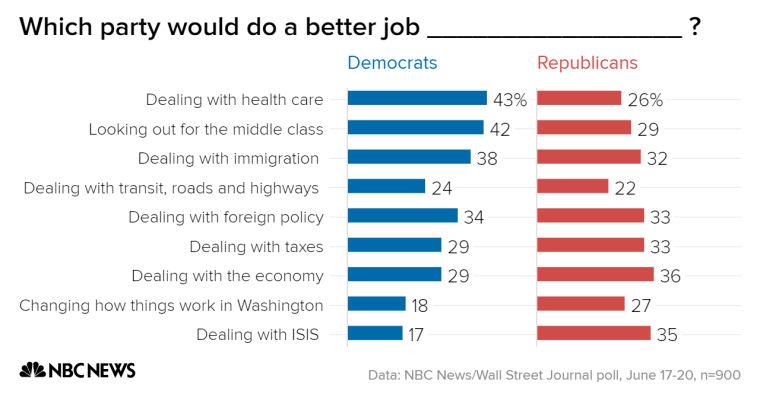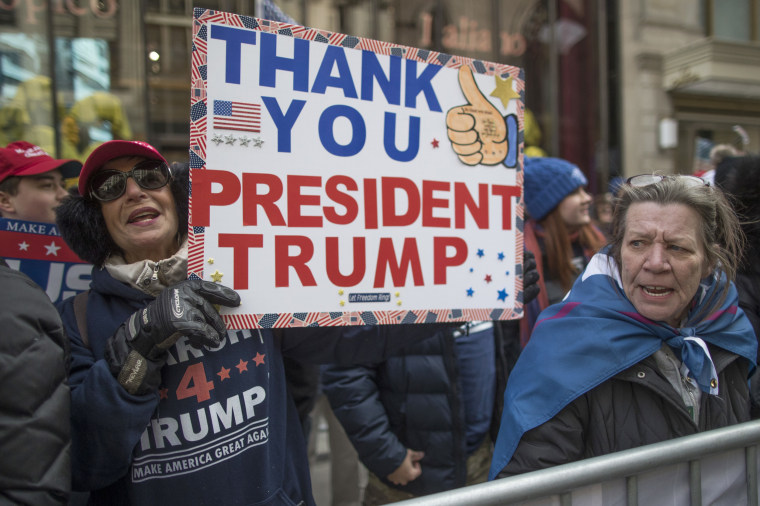First Read is your briefing from Meet the Press and the NBC Political Unit on the day's most important political stories and why they matter.
Trump’s Base vs. Everyone Else
President Trump job-approval rating in the latest NBC/WSJ poll stands at 40% — essentially unchanged from where it was a month ago at 39%. And there’s a fascinating dynamic inside that approval rating: It’s Trump’s base vs. everyone else. Republicans support Trump by an 82%-13% clip, while Democrats disapprove of him by 90%-6%, and independents break against him by a 63%-35% margin. And if that 40% for Trump (or thereabouts) looks familiar in our NBC/WSJ poll, well, it is:
- Trump’s positive rating: 38%
- Those preferring a GOP-controlled Congress: 42%
- Those who believe Trump’s problems are due to the DC establishment (and not his own competence and inexperience): 42%
- Those who believe the economy has improved and Trump deserves credit for it: 38%
- Those who think Obamacare is a bad idea: 38%
- And those who believe the efforts to repeal and replace Obamacare should continue: 38%.
Under the normal rules of politics, a politician needs majority support — or more. But this magic number of 38% to 42% is keeping Trump and Republicans afloat right now. And because Republicans are in the majority in Congress, that 38%-to-42% remains the most powerful faction in politics. And it explains how health care COULD pass, no matter the popularity of the legislation. The question is: How long can that minority force last? Remember, the unemployment rate is at 4.3%, and Trump has yet to face an external crisis or threat.

The problem here on health care
That base isn’t quite there on the House bill (and maybe Senate bill, too): The one potential problem for Republicans on health care, however, is that the 38%-42% isn’t behind the health-care bill that passed the House last month. (And given that the new Senate bill resembles the House legislation, that might apply to that bill as well.) Per the NBC/WSJ poll, just 16% of adults believe that House health care bill is a good idea, versus 48% who say it’s a bad idea. Strikingly, even Republican respondents in the poll are lukewarm about the House bill, with only 34% viewing it positively (and 17% viewing it negatively). By contrast, 73% of Democrats and 48% of independents view it negatively. So compare that 16% who think the House bill is a good idea with the 38% who want Congress and Trump to continue efforts to repeal and replace Obamacare. There is still a lot more GOP enthusiasm about repealing Obamacare than passing the House (or Senate) legislation.
The Senate GOP health care bill doesn’t repeal Obamacare; it replaces Medicaid
So what’s in the health care legislation that Senate Republicans unveiled yesterday? Here’s NBC’s Benjy Sarlin: “The 142-page Senate health care bill released on Thursday is easy to summarize: It cuts health care spending for low-income and middle-income Americans and uses the savings to finance large tax cuts for the wealthy and the medical industry. How it accomplishes this is simple as well: It makes large cuts to Medicaid and to subsidies for private insurance, meaning large chunks of money that the government would have spent on helping Americans afford coverage, pay for long-term care and reduce their out-of-pocket costs would instead be paid either by states or by the customers themselves.” As Axios’ Justin Green puts it, “The health care bill Senate Republicans unveiled yesterday would not replace Obamacare. It would replace Medicaid.” Indeed, that’s why conservative policy wonks like Philip Klein aren’t happy with the legislation. "[T]he draft legislation unveiled by Senate Majority Leader Mitch McConnell, R-Ky., reads less like an Obamacare repeal bill and more like an Obamacare rescue package,” Klein writes. The question for Republicans: Do they view the legislative through a policy lens — or a political one?
McConnell’s win-win approach
Either his bill passes quickly or it dies quickly: And politically, it appears that Senate Majority Leader Mitch McConnell sees quick action on the legislation accomplishing one of two things — either it passes quickly, or it dies quickly (to allow Republicans to move on to other matters). But if does pass and become law, remember that many of the provisions (like phasing out Medicaid) don’t happen for a while. And so it’s easy to see how Democrats, when they return to power, re-establish the Obamacare provisions — or even go full single-payer. Bottom line: We’re not sure the Senate bill, even if it passes, provides certainty to the health care system.
More from the NBC/WSJ poll: Democrats lead on health care, Republicans lead on the economy
The NBC/WSJ poll also shows that Democrats hold a 17-point advantage on which party does a better job dealing with health care, while Republicans enjoy a 7-point edge on the economy. Here are the numbers on which party would do a better job on the following issues:

Democrats hold an 8-point advantage in congressional preference. Here’s what that means
Despite their defeat in GA-6, Democrats should a feel a bit heartened by their 8-point lead in congressional preference in the NBC/WSJ poll, 50%-42% — their biggest advantage in the poll since Oct. 2013 (during the government shutdown). That’s the positive news. The negative news here is that when Democrats have scored big midterm wins, their advantage in congressional preference has been in the double digits. What’s more, Republicans on this measure enjoy a 52%-41% lead in GOP-held districts vs. Democrats’ 62%-28% lead in Dem districts, which helps explain what happened in GA-6 on Tuesday. Democrats may very well have the political winds at their backs, but those gusts haven’t blown into Republican areas — at least not yet.
Trump fixates on Russia, while the political world focuses on health care
Yesterday was the rare day when Trump paid more attention to Russia than the political world did. Here were Trump’s tweets on the subject:
- “Former Homeland Security Advisor Jeh Johnson is latest top intelligence official to state there was no grand scheme between Trump & Russia.” (Johnson didn’t really say that)
- “By the way, if Russia was working so hard on the 2016 Election, it all took place during the Obama Admin. Why didn't they stop them?”
- “...Why did Democratic National Committee turn down the DHS offer to protect against hacks (long prior to election). It's all a big Dem HOAX!”
- “With all of the recently reported electronic surveillance, intercepts, unmasking and illegal leaking of information, I have no idea...”
- “...whether there are "tapes" or recordings of my conversations with James Comey, but I did not make, and do not have, any such recordings.”



